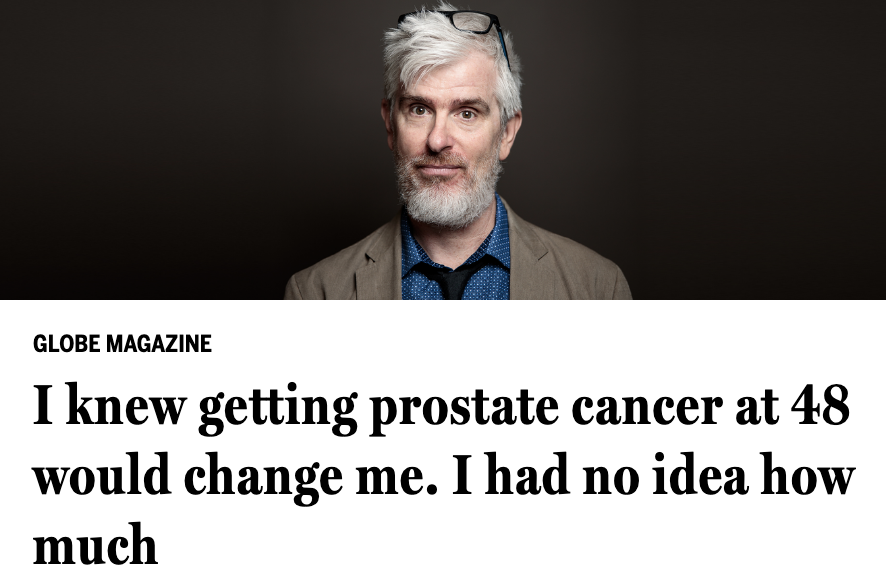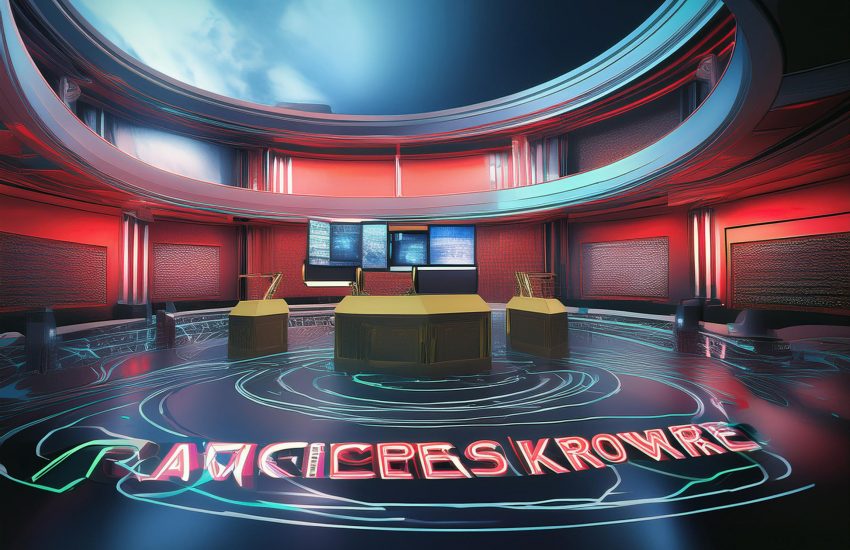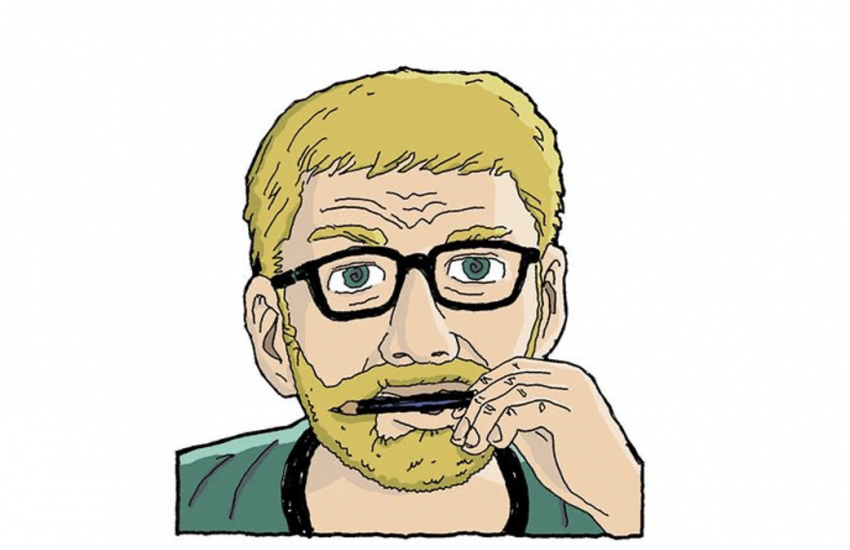How the Boston Globe’s Mark Shanahan made a podcast about his battle with prostate cancer
In a recently published six-part podcast series, Mr. 80 Percent, Boston Globe entertainment writer Mark Shanahan went into granular, personal detail about his treatment journey with a disease that affects one in nine men according to the American Cancer Society: prostate cancer.
The goal was to take an honest, nonclinical approach to the disease to educate men about the risks and realities of the treatment process. The series is rounded out by interviews with Shanahan’s doctors, family, friends, innovators of prostate cancer treatment and former patients, including Shanahan’s father and actor Stephen Fry.
Storybench spoke with Shanahan about how the podcast series came together and his forthright approach. The following interview has been lightly edited for clarity.
At what point in your journey with cancer did you realize you wanted to share it?
Like a lot of other men, I didn’t really want to share it. I didn’t really want to talk that much about it. I wanted to learn about it. I wanted to sort of engage in the research and treatment options and figure all of that out. But as I continued along this path of sorting out what to do and how to do it, it was really super fascinating to me that I didn’t know anything about it. I’m a pretty frivolous fellow, I mean I’m an entertainment reporter, so the idea that I wouldn’t know something about the prostate is not terribly surprising, but what I found out is that nobody knows anything about [it]. I wouldn’t really expect women to know a ton about the prostate, but I would expect men would know something about the prostate, especially considering how common prostate cancer is.
First I was weirded out by the fact that I didn’t know anything, and nobody knew anything, and then I was really fascinated by the fact that the treatment for prostate cancer raises all sorts of issues around continence and potency. Part of me was like, oh, well, that’s why nobody knows anything about it, because they don’t want to know anything about it, because it’s too scary! But then when I got to thinking and reading more about the treatment I was interested to discover how incredibly primitive and barbaric the treatment for prostate cancer had been for years, and years, and years. And then I began to think about, you know, there’s a lot here, and it’s a really good story, and good stories are sort of the currency of journalism. It just seemed like a no-brainer sort of to tell the story.
From what I could tell the podcast format was new to your career. How did you pitch this?
I really didn’t listen to podcasts at all. I didn’t know much about the medium, so I can’t take any credit for this as an idea for a podcast, it was really just sort of an idea. I did think that at some point I might write like a funny little book about my experience with prostate cancer. The idea of doing a podcast was pitched to me. I since have become a big consumer of podcasts, I should say that, now I listen to all kinds of things. It is true that the ones I think, at least, that are most successful, most interesting, are the ones that are about something really sort of off-beat, surprising, unusual.
In the first episode you say that you’re going to be open about everything, was that a decision you made, you know, from the get-go or was that something that evolved throughout the project?
The sort of guiding principle of the thing was that we needed to be not clinical, not sort of sad, exclusively. We didn’t want cancer in the title. We did think that it was important that it have a slight personality. We wanted it to be, you know, transparent, personal, super personal, because that’s what people relate to. You can tell them where the prostate is and explain to them what it does and talk about the incision in your stomach and the fancy robot, you know it’s necessary but it’s not super interesting, or at least it’s not something that people will come back for more of. But if you tell them about the time that you told your daughter that you have cancer, or had a meltdown at your daughter’s eighth grade graduation, if you’re totally honest about the parts of the experience that so many men related to, from the emails that I have received, I mean, it’s nuts.
Yes, we did set out to be super honest and that required a little bit of buy-in from my wife and from some other folks in my life. My in-laws, I think, are a little embarrassed. They’re from a different generation and they think this is embarrassing and why would you talk about this sort of thing. But, you know, whatever, it’s fine. As it turns out it’s really, really, helped a ton of people. Which is again, not why I did it. I really didn’t go into this thing thinking, oh, maybe this will save folks the heartache. I really did it because it’s a really good story and it’s something that so many men go through.
You have a wide variety of interviews, from friends to experts to family, how easy was it to get people to agree to those interviews and what were some of their reservations?
You heard in the early episodes we say that Beckett won’t participate and he wouldn’t, and he still has not listened to it, so that was a little difficult. That was actually okay in a weird way, that people could also relate to that. You have a 15-year-old son who is just not cool talking about his erections with his father. Totally fine. Beyond that, Michelle and I have been together forever, we have a pretty good sense of our boundaries, such as they are. And then you know the doctors, there’s that moment where Pomerantz asks me, well how much of your story, and I’m like, dude, all of it. I have heard from all of them, my surgeon [Dr. Adam Kibel], and [Dr.] Mark Pomerantz, my oncologist, who said, dude, this has been fantastic. For them, for their patients.
I don’t know if one of your questions is whether I have any misgivings about this, but I would say no. Do I wonder if colleagues and friends look at me differently, think of me differently? Not really. I don’t really care. I feel as though we created something that’s pretty interesting. I feel like frankly it could have been a little more. We were doing it for the Boston Globe, we were not doing it for Vice Media, so even though there is some profanity, even though there is some sort of, explicit material, I feel as though there could be a lot more. There were standards of taste and decorum that were sort of imposed upon us.
You already talked a little bit about your audience. I wonder if you could expand upon that a little bit more. You pepper advice for men throughout the podcast. Who was your ideal audience and how do you think that evolved?
We thought we had an audience for sure because half the population is at risk for the disease and then there’s a good part of the other half of the population are involved with, partners of, spouses to the population that’s at risk for this disease. We’ve had some difficulty reaching the audience because even though I was diagnosed at 48, or treated at 48, the average age of diagnosis is considerably older. Those people don’t tend to be big podcast people. However, one of the points of this thing is that this is information you might not need to know now, but someday you will be 65 or 70 years old, so the idea is that you should be paying attention. My own father had been treated and I didn’t know anything. One of the reasons I didn’t know anything is because he didn’t want to talk about it. He’s not like me, he’s not super confessional. It’s men, those are the people that are at risk for the disease and there are a lot of men. So we thought that if we could somehow put this in front of them and get them to listen that we did have an audience.
Was there any point in the project where you kind of looked back and realized you were on a different track than you thought?
I worked with these two producers, Kelly Horan and Scott Helman, both of whom had experience making podcasts. I didn’t have any. I had sort of a narrative in my mind and I could imagine what the episodes might be, but in terms of how to actually do it, I didn’t know. I would write these kind of capsule episodes but in essay form and then [Kelly] would write a script and then we would sit around for three or four hours and edit the script. We might do that two times and then we would record the script and the script would include some narrative of mine, punctuated throughout by tape from various people. I don’t know how to do that. I don’t think I could do it again without some help.
There were times along the way where I wasn’t quite sure whether there was enough of me, or how much do we need from Patrick Walsh. I just wasn’t sure, so it was helpful to do this thing with people who had done this thing before. And they assured me, this thing is good, and we think when we get to the end of this episode that we have enough narrative tension building here that people will come back for the next one. The decision to drop three episodes, that was a little weird. That was a decision that was made because the Globe was having some difficulty selling ads for the thing.
I guess someone was hopeful that if we dropped three and there was some momentum, some positive vibes, some discussion about the podcast that maybe people would get on board after the three. That didn’t work. It was crafted in a way that I think people now binge the thing, as they do most podcasts. Anecdotally it seems like people are doing that.
Those six episodes, was that always your plan?
We just felt as though this story, it’s a discrete—there’s a beginning and there’s an end. If there hadn’t been this pandemic situation we thought that there might be a seventh episode which would be a recorded live thing with some of the dudes and some of the spouses and that could have been super interesting, where we would have had some other stories and some humor. The other thing was we were originally going to post this thing on Father’s Day in June because we felt as though there was a certain synergy there. We had to make that decision at the end of April or early May and people at that point were so freaked out about the pandemic that we just didn’t feel like, you know, cancer was going to be like the palette cleanser that everybody wanted.
And then September was prostate cancer awareness month and so that seemed like a possibility but then it was like it’s going to be after Labor Day and everyone’s attention is going to be focused on the election but we were like, we just gotta do it. The roll out was problematic for a number of reasons, but you know, whatever. I’m just the guy who got the cancer. That’s somebody else’s job.





